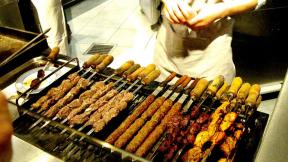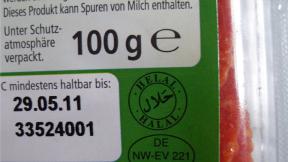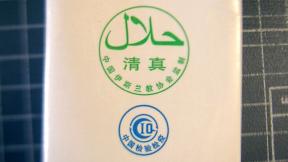
Before you feast on that carefully selected Halal burger from your local Muslim grocer, consider this disturbing statistic: 75 percent of Halal meat in America produced in the year 2000 came from pork fed cows, according to Dr. Stephen Emanuel, from Agway Feed Company.
The story gets even worse in light of the recent discovery of mad cow disease. The first case ever in America was discovered in Washington state in December 2003. Mad cow disease in animals is caused by animal cannibalism- the practice of feeding animals used for human consumption with other animals. This practice is a meat industry standard.
The truth is that beef, as well as all other animal products, including chicken, dairy, and eggs, are not safe, even without the risk of mad cow disease. Most are jam-packed with fat and cholesterol and increase the risk of heart disease, cancer, and diabetes. (Yes, chicken has nearly as much cholesterol as beef.) Loaded with too much protein, they raise the risk of kidney disease and osteoporosis. And given intensive farming and slaughtering processes, they're often contaminated with foodborne pathogens.
In the United States the cows are being fed pork based protein, like pork meat byproducts, pork bone meal, explains Mazhar Hussaini, president of the North American Halal Foundation. It is also the same with chicken.
Muslims are directed in the Quran to eat food that is Halal and Tayyib. Halal is defined as food that is permissible according to Islamic law. Tayyib means wholesome, pure, nutritious and safe. Traditionally, Muslims in North America have emphasized the Halal over the Tayyib when it comes to meat consumption, Hussaini says.
For instance, great emphasis is placed on ensuring that animals slaughtered for consumption are done so in the Islamic manner (the practice known as Zabiha). However, little to no attention is given to whether or not the animal itself is healthy, free of disease, hormones, antibiotics, and chemicals at the time of slaughter. Also, what kind of food it consumes is not taken into consideration, despite the fact that herbivorous animals only are permissible to eat.
Moreover, price is a major consideration for Muslims, at the expense of meat quality.
My experience is that Muslims are willing to pay for Nike shoes for $150 but when it comes to meat to feed their family, they will bargain on pennies, says Adnan Aldayel, president of Dakota Halal Inc. The company produces Halal meat products which are raised on vegetarian diet distributed primarily on the East and West Coast.
Organic meat is one option for Muslims insistent on feeding their families Halal and Tayyib food.
Organic meat is produced with animals raised on land free of pesticides, fertilizers, genetically engineered or irradiated foods. Farmers keep a detailed record of all methods and materials used in growing or producing the meat. With cows, all feed and pasture on which they are grazed must be organic. They are also not allowed hormones or antibiotics. However, they can be vaccinated. Animals are considered organic after three months of being raised on an organic farm.
Thirty-nine percent of the US population uses organic products. Sales of organic food totaled $5.4 billion in 1998, about $6.5 billion in 1999, and reached nearly $7.8 billion in 2000. The market has grown 20%-24% annually during the 1990s
Although organic foods account for less than one percent of total retail food sales, this sector is growing faster than any other area of the food industry. Since 1992, sales of organic foods have increased by more than 20 percent annually with continued strong growth expected for at least the next decade.
But according to Hussaini, organic is not the only choice Muslims have if they want to maintain a diet free of Haram and hormones. Meat produced on natural farms is another option.
Natural beef is produced from animals not fed any meat-based proteins, hormones or preservatives. Animals are fed grass, hay, corn, beans and oats. Natural farmers do however use antibiotics and different kinds of medicine if an animal is sick. However, they will wait 30 days after administering antibiotics or medicine to slaughter the animal. This is done to make sure the effects of the antibiotics are no longer in the animal's system. An animal is considered natural after living three months on a natural farm.
At the moment there are few Halal meat producers who choose animals for their products that are strictly fed non-animal feed. Aldayel's Dakota Halal, CrescentHalal.com (hand slaughter) and the Ohio-based Halal Pride Chicken (machine slaughter) are three that have taken steps towards the Tayyib, not just Halal.
An additional problem, according to Aldayel, is that most owners of Halal meat shops across the United States do not really care if the meat they are providing customers meets the best standards of Halal and Tayyib. In some cases, he says, grocers have bought non-Zabiha meat and sold it to unsuspecting customers as Halal.
"UCSC farm rows" by david silver - originally posted to Flickr as UCSC farm rows. Licensed under Creative Commons Attribution-Share Alike 2.0 via Wikimedia Commons - http://commons.wikimedia.org/wiki/File:UCSC_farm_rows.jpg#mediaviewer/File:UCSC_farm_rows.jpg








Comments
Great Article Found here
Hi, I was strolling over the net. Suddenly i came across this link it is great !
Ghayoor is is also a best Digital Marketing in Hyderabad Executive and Trainer
Location
Anyone interested in organic halal meat can visit www.blossompure.com. Organic halal meat can also be shipped to the US :)
Location
This was truly an eye opener. I have always been fond of organic, nutritious, and wholesome foods. To emphasize this is truly fantastastic. It gives a new meaning to the word Halal and can be used to prevent many health problems in the community and world. After all, obesity is causing many health problems and eating less meat and saturated fats from the animals would really contribute to less obesity. Also, eating fast food contributes to a lot of obesity also which will be reduced by focusing on such ideologies. We need to promote more awareness of these principles to government regulations and policy makers.
Location
Thanks for valuable information, But it seems to have more public involvement and government regulation to counter such situation and avoid spreading such disease.
Location
Thank you for making this kind of information available to Muslims. I hope to see more public awarness and more importantly solutions to this problem.
Location
The process of slaughtering and storage is not enough to signify a product to be Halaal.Muslim Councils need to be involved in the whole process or cycle of a animal to give certification We need to go beyond the point of just the method of slaughtering and be contend that the meat is halaal We must determine origin of animal and where the animal was born System endorsed with regards to feeding and nurturing of animal These functions should be the responsibilty of Muslim regulating authorities who have the responsibilty of certifying meat as being halaal It does not make sense that live stock are being fed pork and animal flesh and then sold to abbotoirs that slaughter and certify halaal We need to be more pro active and take the lead after all we are the consumers of this meat So it is the whole process from birth to feeding and food types and medication and interaction with other animals that determines if this animal is lawful for consumption Salaam
Location
Thanks for your article. What a sad and crazy world it is when animals are treated the way they are in this country, all for increased profits. Ever since the first case of Mad Cow disease was found in America (the products from which were sold in the town I live in) I have felt that it is better to eat meat that is tayyib but not halal, instead of halal but not tayyib. It is sadly unfortunate that meat that is halal and tayyib is so hard to find. Fortunately I live near a place that sells a wide range of natural meats only. But it is time that muslim start demanding their halal butchers seek out natural and organic cows instead of seeking out the cheapest halal butcher available. Inshallah things will soon get better.
Location
This is a very informative article. I always was curious of the market that my husband and I use. Many times the meat was extremely bloody which I have never encountered when travelling in predominately muslim countries. Now it's even more disturbing to know that some of the meat I've been thinking was halal has been fed animal byproduts subhanAllah. However in smaller cities where the muslim population is small you often don't have much of a choice unless you decide to go vegetarian or vegan.
Location
This article has been very helpful. We raise naturally fed goats. I am seeking a halal facility to help butcher and market them. It appears there is an interest in the type of product we are producing. Is there anyone in this state who is interested in helping provide this natural meat to the consumer??? Please e-mail us, we have market ready animals available now.
Location
I have been wanting to found an organic halal meat mail order company for quite some time. is there anyone in the uk interested in such a business scheme if viable.
Location
Pages
Add new comment